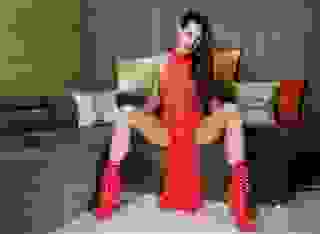Note: You can change font size, font face, and turn on dark mode by clicking the "A" icon tab in the Story Info Box.
You can temporarily switch back to a Classic Literotica® experience during our ongoing public Beta testing. Please consider leaving feedback on issues you experience or suggest improvements.
Click hereFirst among them -- his father passed. Control of the family's fortunes fell to his mother Claire, then it seemed that within weeks of his beginning his studies that John Kennedy was murdered. He had been taking an introductory class in Japanese literature that first term, and about the time news of the event rattled around the globe he had been sitting by a fireplace lost in his explorations of The Tale of the Heike, and as it happened, and as these things so often do, he had just finished a key passage when the news fell on his ears. To Jere, this was a moment cast away by time, an orphan without explanation -- a lonely boy waiting to be embraced.
The sound of the Gion Shōja bells echoes the impermanence of all things; the color of the sāla flowers reveals the truth that the prosperous must decline. The proud do not endure, they are like a dream on a spring night; the mighty fall at last, they are as dust before the wind.
And so, in a way, 1963 became his year of passage. The year Kennedy and his father passed from one life to the next. A year of remembrance, and of tears.
And in this confluence of events, perhaps like two streams coming together, it wasn't long before he found his way to Shinto, and as a result he came upon an unforeseen way of experiencing the world, a new way of understanding death: to be conscious of kannagara no michi.
And as this was the path that had chosen him, he cared not even a little that this was perhaps the one path his father would have mightily disapproved of.
Chapter Three
Seattle | Today
"Is this what you eat? Omelets...and mushrooms?" Akari said, looking up at him as he reduced a skillet full of mushrooms, adding a little white wine and a few impossibly thin slices of shallot after the mushrooms had browned just so.
He nodded, slowly, a sly grin spreading like cold treacle across his face. "If I require more than what I have," he shrugged, "well then, the entire world has come to this little city, Akari. It's a fantastic time to be alive. Nothing but unappreciated choice, and everywhere you turn hardly anyone notices. Or even cares, really."
"But," she added, not buying his latest dodge, "what of the fish you purchased? Where is this secret woman of yours?"
"Oh, my dear. Did I say I had a woman?" Jeremy Fontaine sighed, shrugging playfully with a coy roll of the eye. "But Akari, I do have some saké on hand, should the desire arise. A decent selection, I might add."
"Of course you do. You always do."
He smiled. "Yes, of course. Always the stranger in a strange land, but of course I remain very much afraid that, as such, I will never find my way home."
"Were you ever at home, Jere? I mean really, in-your-skin at home?"
His smile broadened. "No, of course not. How could something so impossibly real suit the likes of me?"
"So, are you not at home? In this here and now?"
The smile vanished, his bushy white eyebrows curled in deep furrows. "Do you know, Akari, I'm not at all sure that I'm not. Isn't that strange? Almost like a strange -- what? A twist of fate?"
She turned away and walked to the fireplace and studied the ancient red kimono, then the two swords, each in their turn. They still called out to her, even after she had turned away from then -- once upon another time now very far away. They had, after all, when what was known about their past came undone, belonged to her father. Then, for the briefest moment, to her mother. But, she now knew, that was when they passed to Jeremy Fontaine. And so here they were, hanging over an Englishman's mantle -- held by no hand now and so far from the distant fires of their creation. So, she wondered why she saw absolution hanging there in the bright, grim light...
"Would you mind helping me with these things?" he called out from the kitchen.
She went to his voice -- hadn't she always? -- and she took in his artistry. Mushrooms and shallots over roasted artichoke hearts and an omelet, but then another plate, this one loaded with thin slivers of king salmon sashimi. He gently tossed a small salad of butter lettuce topped with walnuts, apples, and a sprinkling of Stilton bleu. Riesling, too, because he was, after all, still an Englishman. She carried the plates to a varnished redwood table on the deck overlooking the sea and he rolled along after her, now admiring the golden sky and the sun setting carelessly beyond the Olympics.
"I like the house," she said after a first tentative sip of his wine. "It fits you."
He nodded. "A local architect drew it for me. Llewelyn Sumner, very radical for his time. Probably a Welshman -- but one can never quite tell these days."
"You still enjoy working in the kitchen, I see."
"No, I don't. Normally I can't be bothered with such foolishness, but then again...this hasn't been a normal day, has it?"
"No, I suppose not."
"The salmon? Do try a piece?"
She nodded, then turned and looked out to sea. "I think I always saw you living in the mountains. Why did you come here? To the sea?"
He turned and looked at a passing boat, then like an old conductor turning to face his orchestra he spread his arms wide. "Why Akari, just look around, will you? We are surrounded by mountains here, though they hide away in their clouds all too often..."
"Are you hiding, Jere? Here, in your clouds and rain?"
He smiled. "There is no hiding for me now, Akari. Not from the things I have done." Or that I must do, he reminded himself as he turned to look at her. "So? You must be dying? I can't imagine you coming otherwise."
She took beautifully lacquered chopsticks, and with those glowing obsidian lances she picked a piece of salmon and held it up in the fading light, regarding it thoughtfully as she gathered her thoughts. "You were never so direct, Jere? So devoid of tact? What has happened to you?"
"I'm not exactly sure. Perhaps I've eaten at Burger King one time too many, learned that eating is a pointless exercise in..."
"Stop!" Akari cried. "Enough with your evasions! I asked you a question. What has happened to you?"
He seemed to deflate for a moment, to slump a bit in his wheelchair -- as if the truth of the moment was a burden he could no longer shoulder. His head fell, his face dropped away, but then he caught a deep breath and lifted his eyes to the setting sun, smiling again as he found the last of the warmth...then he caught sight of something in the sea and smiled. He then pushed his chair back from the table and turned to face the sea and his little dock -- that pointed like an accusing finger at the sprawling blight along the far shore.
"Here she comes," he said, his voice now reverent, a prayer to and of the unknown.
"What?" Akari said, confused by his sudden change in demeanor. "Who is coming?"
"My spirit friend. The kami that have aroused all your anger will flee now."
She turned and looked at the sea, watched a faint disturbance heading toward his dock and she thought the change she saw in the sea most odd -- for a moment. A steady, purposeful motion came to them, and she was puzzled. A...kami? A spirit? Here? Visiting him?
Then a small head appeared, the first glimpse of an unseen creature as it continued its careful approach, an undeniable cadence that seemed to announce both purpose and a gentle homecoming.
Then a small sea otter flew out of the water, landing on the dock but then stopping to surveil an unforeseen development in this place. A stranger was there beside the man, her man, and her small black eyes appeared confused for a moment -- before the power of their reunion became too much for her to resist. She ran to him, pulled herself up the blanket that covered his legs before she circled his neck once, then again -- his smile now deep enough to warm them both. She dropped to his lap and waited, watching the stranger warily for a moment before simply ignoring the interloper.
He gave her pieces of fish and bits of raw carrot he kept in a pocket just for her and she ate and ate and the more she consumed the happier he became, and when there was no more to give he wrapped her in some of the blanket that covered his legs. She rolled a bit, exposing her belly and he knew what she wanted now so he rubbed her cold fur, drying her with the warmth in his hands until she grew sated and soft. And then she fell asleep, giving in to this quiet place in his arms.
And Akari watched, fascinated by the transformation within this man she thought she knew so well -- and she watched the little sea creature too. Until she realized with a start that she had never really known anything about this man...anything at all...but by then the unexpected contours of her realization had left her feeling breathlessly alone and unsure how to proceed. But hadn't that always been the way where his secrets were concerned?
Yet as she watched the man she thought she knew, she began to see and understand how utterly alone he was. But hadn't that always been the way life came to spies? Especially the old ones? With nothing left to keep them warm but the deep secrets still buried in their hearts?
Chapter Four
Tokyo | Yesterday
The matter was never in doubt. Jeremy Fontaine joined The Service when he finished his studies, and he was forthwith dispatched to No 1 Ichiban-cho, Tokyo, nominally posted as one of the many commercial attachés attached to Her Majesty's Embassy, and once there he began to develop ties to industry and within academia. He spoke the jargon-laden lingua franca of local commerce flawlessly, and he easily mingled with elements of the PSIA when the need arose. He was, to be blunt, everything a good spy was not. Which, oddly enough, made him the perfect spy.
If spies were otherwise known to lurk about in dark shadows, Fontaine thrived in broad daylight. When he visited large industrial concerns, where his peers more typically met with layers of silence, Fontaine disarmed the subjects of his inquiries with dusty bottles of the rarest scotch whiskey. He took CEOs golfing and soon enough the privilege was reciprocated; when he let it be known that he had been playing golf since he was seven years old his stature only grew. Soon he had sponsored memberships at two of his favorite courses, the more exclusive Hirono course and then the even more spectacular Kawana Fuji course. And of course Fontaine was an active listener who never failed to pick up the rarest insight, and it was said his knowledge of nightlife in Tokyo was second to none. So yes, he was a perfect spy, even if everyone knew exactly who and what he was.
Superiors in the embassy praised the depth of insight Fontaine provided in his timely reports, which were in due course handed over to the Americans. Within a year MI6 sent him to the CIAs Field Officer's Training Course outside of Yorktown, Virginia, thence to a language institute in Monterrey, California to study Korean. When he returned to Tokyo he was soon immersed in the day to day activities of the PSIAs Third Division of the Second Intelligence Department, in other words he was soon "monitoring" developments in North Korea.
And the perfect spy began to better understand the currency of secrecy. He became a practitioner of the art, too.
But all the real action was happening just north of the Korean peninsula, in the Tartarsky Straits, with all the various naval attachés keeping their keen eyes on developments in the latest classes of Soviet submarines, so in effect Fontaine's efforts were usually shunted aside, put on the back burner, and though only in his late twenties he was quietly, and rather suddenly, burning out.
But then the unimaginable happened.
He chanced to meet a girl, a Japanese girl just a few years younger than himself, and as it happened she was not a spy. Rather far from it, as luck would have it. Her name was Aki, and she was the daughter and only child of Japan's long-term economic advisor to Japan's current Ambassador, then posted to the United Kingdom. Without laboring the point too finely, having lived in neighborhoods around the Thames almost all her life, Aki had spent more time in and around London than Jeremy ever had, and the case could be made that she spoke the Queen's English far better than he, as well. She attended Prior's Field where she took high honors in chemistry and he noted she played a mean ragtime on the piano. Aki was, in short, tailor made for Jeremy Fontaine, yet even so, oddly enough, it was his mother who first thought of arranging a first meeting of the two.
After her husband, Jeremy's father, passed, Claire Fontaine resumed her career at the Foreign Office, soon preferring to spend only infrequent weekends in Cheltenham, and in the course of her duties she routinely "interfaced" with Aki's father, and it was during one of her meetings with Kaito-san that she first met Aki, his daughter. Currently in town for a long weekend, she was studying biochemistry at St John's College, Cambridge, working under Frederick Sanger refining the partition chromatography method of sequencing amino acids. And, it turned out that when not so engaged she played jazz bars not all that far from Bodley's Court. Upon learning this, Claire Fontaine knew Aki was the perfect match for her one and only.
And so it happened, only not in the manner Kaito-san and Claire Fontaine had so artfully and dutifully arranged. Yet soon enough they spent all their free time together -- talking chemistry. They fell in love -- discussing chemistry. They continued to see one another on a regular basis, yet before all the ensuing madness Aki's father and Jeremy's mother had wed. And while most of these things happened long before Aki and Jeremy ever laid adoring eyes on one another, the first most important result of this new union was Kaito-san's summary dismissal from the diplomatic corp and his immediate return to Japan. And his new wife dutifully followed, the happy couple moving into Kaito's family's ancestral estate in the mountains just west of Hakodate, on the island of Hokkaido.
Yet his mother's actions caused Jeremy no little amount of distress. She left the estate south of Cheltenham in his care, necessitating frequent trips home to manage affairs he had long taken for granted. Also, as it happened the FO, or the Foreign Office, had taken a dim view of his mother's actions and it seemed to Jeremy that they had decided to take all their recent unhappiness out on him. So, on one of his many trips home and after being absurdly abused one time too many, Jeremy simply resigned from government. He thought about moving out to Cheltenham and might have, too, had it not been for his meeting -- finally -- Kaito-san's daughter Aki.
And yes, as predicted they were indeed a perfect match. But now, with their parents out of the picture they talked long into many a night about -- pursuing post-doctoral degrees, together, of course. So marriage seemed a decent way to proceed, at least until it dawned on them that pursuing such a course of action would be plainly peculiar -- as technically they were now step-brother and step-sister. Hardly a relationship conducive to cultural approval, they both knew.
Ah, yes...but what about America? America -- the land of constant reinvention, where those disinclined to more restrictive norms often went in search of the road less traveled?
They talked more about the idea. They planned, then they schemed. She applied to Berkeley, he to Stanford, and upon acceptance he leased the ancient familial lands astride the Devil's Chimney and they planned their escape to California. And yet all the while keenly knowing eyes followed him down this new, undiscovered way, for there is an old saying just as appropriate now as it ever has been, to wit: once a spy, always a spy. Which, as he was reminded just a few years later, choices always have consequences -- some more deadly than others.
Chapter Five
Seattle | Today
He knew people. Human interactions had, of course, always been his medium of exchange, the currency of survival he had long collected in service of an empire that had long depended on obscure, often deliberately hidden knowledge, for its very survival. Sometimes it was the merest scrap that made all the difference, and that remained a maxim Fontaine held to even now.
He called Carolyn, as she was the one he called first when he needed specific knowledge of hidden treasures in and around Puget Sound. Because she too knew people, she maintained her own intelligence network, and when she knew what there was to know she drove over to Patrick's impossibly gray house. Once there she stopped and looked at Sumner's masterpiece from the street, marveled at the incongruous angularity of the architect's secret way with hidden walls, and each time she drove up the driveway she rediscovered all the hidden gardens under their mitered glass windows and only then could she make out all the odd little statues scattered about these hidden glades -- and that each seemed to mean something quite special to the man lurking within.
What had Patrick said about all his little statues? That they were the houses of the kami that resided around the house? The 'Spirits' of his journey, hadn't he told her as much? And yet even to this day, even in her white Mercedes outside the gray house surrounded by towering green pines, she saw the little statues in their hiding places and her mind drifted to other times, to the odd moments here and there when she'd asked him to explain what he meant by 'spirits'. And yet with this strangely quiet man his reaction was, as ever, unchanging and obscure: the same odd little smile that creased the face, the clear gray eyes under gently furrowed brow darting this way and that. The same dismissive, wayward shrug of yet more secrets to be kept.
For now.
Almost as if he was waiting for just the right moment to set all his spirits free.
And when she rang the bell that morning -- not a doorbell, mind you, but an ancient bronze bell atop a cedar post gray with age -- the slate gray door opened and the same elegant woman in black appeared. Then there was Patrick in his wheelchair, only this morning he was rolling along with the weight of the world on his straining shoulders. Into the van and across the water to Aloha Street, to the university's Fred Hutchinson Cancer Center, to where a confirmation of diagnosis awaited the elegant woman.
A first meeting with the recommended oncologist Carolyn uncovered, the documents the stranger dressed in black carried by her side -- on her recent journey from Hokkaido.
Documents detailing a diagnosis of fibrillary, or diffuse, astrocytoma.
The stranger's documents soon reviewed by the physician Carolyn uncovered, one Scott Andrews, MD. An MRI scheduled and her first treatments organized. Within a few days Akari's future, the oncologist told Patrick, would be mapped out -- in what felt like nauseating detail. 'Treatment will not be easy,' the calm voice of Dr. Andrews advised the spy, 'or pleasant, but we have had recent success with agents that might offer a meaningful extension of life.'
'Ah,' the spy thought, his brooding cynicism waking up, 'so now the oncologist is selling Hope.'
He looked around the physician's world, a world he was once more than familiar with, and he felt faint tendrils of nostalgia wrapping around the core of his soul.
'So, when did I become such a cynic?'
Chapter Six
Hakodate | Yesterday
He is walking with his mother on a chilly September morning. Along a narrow trail that skims along the side of a cliff, with the sea a few hundred feet below them as they talk. A thundering surf crashes into huge rust colored rocks down there in the mist, and yet he feels fresh salt spray falling from above, coating the way ahead, turning the trail into a slippery mess of oozing mud.
How can this be so?
"A storm is coming, Jere," she has just said to him, her voice hiding the same subtle tremor that has over the years filled him with both fear and longing. It is the same crenelated voice he heard when she first spoke of his father's illness, yet it is the very same as when she spoke of going to play golf -- "Just the three of us..." as she would say, meaning that for once her husband was home for the weekend and they could pretend to be a family -- for a while, anyway. How he longed for that feeling, even now. To be together again, the three of them. Again, forever.








